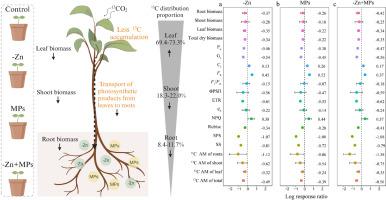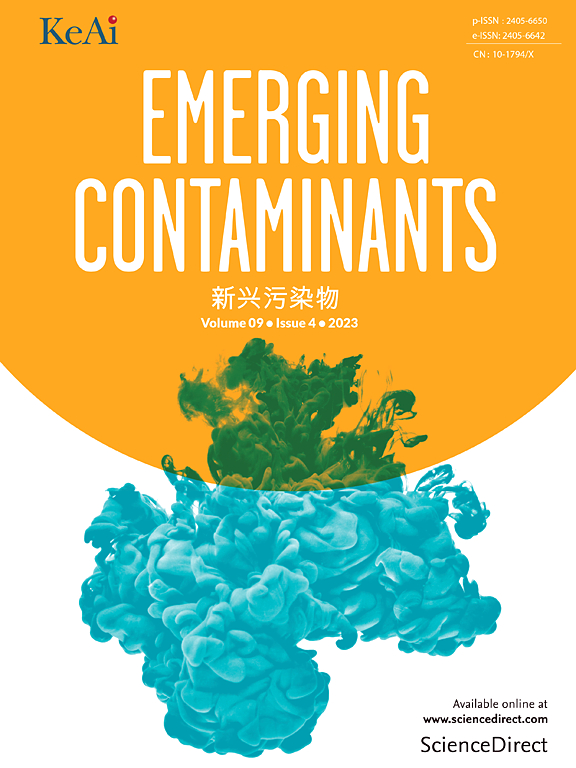微塑料加剧缺锌对苹果砧木Malus hupehensis (Pamp.) Rehd幼苗生理生化特性的抑制作用
IF 5.3
2区 环境科学与生态学
Q1 ENVIRONMENTAL SCIENCES
引用次数: 0
摘要
微塑料(MP)污染和锌(Zn)缺乏都会对陆生植物产生不利影响。然而,微塑料污染和锌缺乏对植物生理机能的综合影响仍有待探索。本研究采用盆栽试验和 13C 稳定同位素示踪技术,研究了 MPs 和锌缺乏对 Malus hupehensis (Pamp.) Rehd 幼苗的生长、光合生理和叶绿素荧光特征以及光合产物的合成和分布的综合影响。结果表明,与对照组相比,单独和联合处理 MPs 和锌缺乏的幼苗的生物量、气体交换参数、碳水化合物代谢酶活性以及光合参数(包括 Fv/Fm、ΦPSII、ETR 和 qp)均明显降低。值得注意的是,与单一缺锌(RR = -0.37)和 MPs(RR = -0.26)处理相比,缺锌和 MPs 联合处理对根生物量(RR = -0.42)有更明显的抑制作用。随机森林分析表明,叶绿素荧光特征(37.5%)对幼苗生物量变化的影响最大,其次是各器官的 13C 积累(26.7%)。MPs 通过抑制叶绿素荧光参数(Fv/Fm 和 ΦPSII)加剧了锌缺乏对光合作用(Pn 和 Gs)的抑制,进一步减少了根部的 13C 积累。总之,MPs 的添加加剧了缺锌对光合参数的抑制,削弱了叶片的碳同化能力,阻碍了光合产物在叶片中的合成及其向根系的运输,从而进一步抑制了根系的生长。该研究揭示了MP污染和锌缺乏对陆生植物的综合胁迫,加深了我们对潜在生态风险的认识,为制定有效的缓解措施保护植物生态系统提供了科学依据。本文章由计算机程序翻译,如有差异,请以英文原文为准。

Microplastics aggravate zinc deficiency-induced inhibition of physiological-biochemical characteristics in apple rootstock Malus hupehensis (Pamp.) Rehd seedlings
Both microplastic (MP) pollution and zinc (Zn) deficiency have adverse effects on terrestrial plants. However, the combined effect of MPs and Zn deficiency on plant physiology remains unexplored. In this study, a pot-culture experiment and 13C stable isotope tracing technology were employed to investigate the combined effects of MPs and Zn deficiency on the growth, photosynthetic physiology and chlorophyll fluorescence characteristics, as well as synthesis and distribution of photosynthetic products in Malus hupehensis (Pamp.) Rehd seedlings. The results revealed significant reductions in biomass, gas exchange parameters, carbohydrate metabolism enzyme activities, and photosynthetic parameters including Fv/Fm, ΦPSII, ETR and qp in seedlings subjected to both individual and joint treatments of MPs and Zn deficiency compared to the control group. Notably, the combined Zn deficiency and MPs exhibited a more pronounced inhibitory effect on root biomass (RR = −0.42) compared to the single Zn deficiency (RR = −0.37) and MP (RR = −0.26) treatments. Random forest analysis indicated that chlorophyll fluorescence characteristics (37.5 %) had the greatest impact on biomass variation in seedlings, followed by 13C accumulation in various organs (26.7 %). MPs exacerbated the inhibition of photosynthesis (Pn and Gs) under Zn deficiency by suppressing chlorophyll fluorescence parameters (Fv/Fm and ΦPSII), further reducing 13C accumulation in roots. In conclusion, the addition of MPs intensified the suppression of photosynthetic parameters caused by Zn deficiency, weakened the carbon assimilation capacity of leaves, and hindered the synthesis of photosynthetic products in leaves and their transport to roots, thereby further inhibiting root growth. This study reveals the combined stress of MP pollution and Zn deficiency on terrestrial plants, deepens our understanding of potential ecological risks, and provides scientific basis for the development of effective mitigation measures to protect plant ecosystems.
求助全文
通过发布文献求助,成功后即可免费获取论文全文。
去求助
来源期刊

Emerging Contaminants
Medicine-Public Health, Environmental and Occupational Health
CiteScore
10.00
自引率
6.70%
发文量
35
审稿时长
44 days
期刊介绍:
Emerging Contaminants is an outlet for world-leading research addressing problems associated with environmental contamination caused by emerging contaminants and their solutions. Emerging contaminants are defined as chemicals that are not currently (or have been only recently) regulated and about which there exist concerns regarding their impact on human or ecological health. Examples of emerging contaminants include disinfection by-products, pharmaceutical and personal care products, persistent organic chemicals, and mercury etc. as well as their degradation products. We encourage papers addressing science that facilitates greater understanding of the nature, extent, and impacts of the presence of emerging contaminants in the environment; technology that exploits original principles to reduce and control their environmental presence; as well as the development, implementation and efficacy of national and international policies to protect human health and the environment from emerging contaminants.
 求助内容:
求助内容: 应助结果提醒方式:
应助结果提醒方式:


